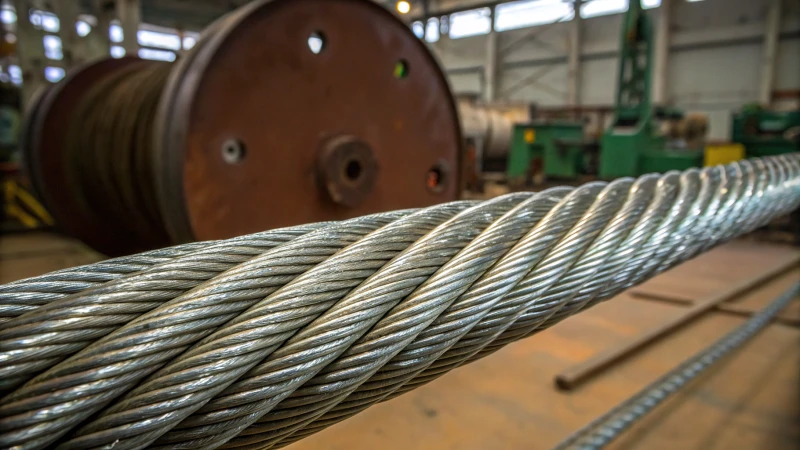
When it comes to industrial settings, surviving the elements is no easy feat for wire ropes.
Wire ropes resist corrosion through careful material choices like stainless and galvanized steel, coupled with protective coatings such as polyethylene. These strategies boost their durability in harsh environments, ensuring safety and long-term use.
I remember my first big project in the construction industry, the sheer panic of realizing the ropes we initially chose couldn’t withstand the salty sea breeze. That’s when I learned about the power of proper material selection and protective coatings. Understanding these nuances not only saved our project from potential disaster but also taught me the invaluable lesson of preparation. Whether it’s stainless steel for almost perfect resistance or galvanized steel for a solid 40% boost, each choice can drastically affect not just performance but also your budget. Let's explore which options might be the best fit for your specific industry needs.
Stainless steel wire ropes are naturally corrosion-resistant.True
Stainless steel contains chromium, which forms a protective oxide layer.
Galvanized steel is less durable than uncoated steel in corrosive environments.False
Galvanized steel has a zinc coating that enhances durability against corrosion.
How Can I Enhance the Corrosion Resistance of Wire Ropes?
Ever wondered how wire ropes manage to withstand the harshest conditions without rusting away?
Stainless steel, galvanized steel, and non-metallic coatings like polyethylene are my go-to materials for boosting the corrosion resistance of wire ropes, ensuring they last longer and perform reliably in demanding environments.
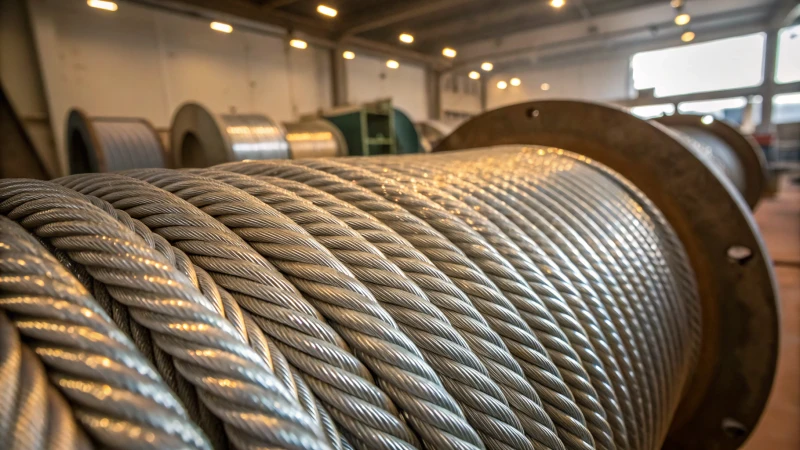
I remember the first time I was tasked with choosing wire ropes for a project involving marine equipment. The stakes were high, and the environment was unforgiving. That experience taught me the importance of selecting the right materials to prevent corrosion.
Stainless Steel: The Ultimate Protector
Stainless steel has been a game-changer in my procurement decisions. Its corrosion resistance1 comes from chromium, forming a protective layer against rust. I often lean towards AISI 316 stainless steel, especially for marine projects, thanks to its high molybdenum content.
| Type | Chromium Content | Ideal Usage |
|---|---|---|
| AISI 304 | 18% | General |
| AISI 316 | 16-18% | Marine |
Galvanized Steel: Affordable and Effective
When budget constraints loom large, galvanized steel is my go-to. Its zinc coating provides sacrificial protection, which means it takes the hit so the underlying steel doesn’t have to. This affordable solution enhances corrosion resistance2 significantly.
Non-metallic Coatings: Modern Solutions
In recent years, I've seen a shift towards non-metallic coatings like polyethylene. Not only do they bolster corrosion resistance, but they also meet eco-friendly3 requirements, which is increasingly crucial in urban development projects.
| Coating Type | Benefits |
|---|---|
| Polyethylene | Eco-friendly, UV resistant |
| PVC | Chemical resistance, flexibility |
Emerging Trends in Corrosion Resistance
I’ve been noticing an uptick in the demand for innovative materials, driven by stricter environmental regulations. Combining multiple coatings4 offers a composite barrier against corrosion, enhancing durability even further.
Understanding these materials and their properties allows me to make informed decisions that extend the lifespan of wire ropes while aligning with sustainability goals. It's not just about preventing corrosion; it's about ensuring every project I manage runs smoothly and efficiently.
Stainless steel wire ropes resist corrosion due to chromium.True
Chromium in stainless steel forms a passive layer, preventing rust.
Polyethylene coatings are not eco-friendly.False
Polyethylene is considered eco-friendly and offers UV resistance.
How Do Coatings Enhance Wire Rope Durability?
Imagine a world where your trusty wire rope never fails, even under the harshest conditions.
Coatings enhance wire rope durability by creating a shield against environmental stressors like corrosion and abrasion, significantly boosting longevity and performance in challenging settings.
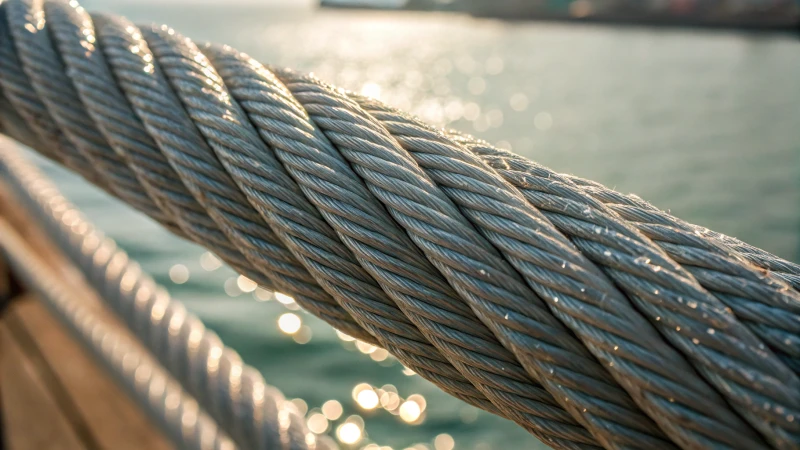
I remember the first time I had to deal with a frayed wire rope on a bustling construction site. It was a stark reminder of how crucial durability is. Back then, I learned that coatings are not just an afterthought—they're essential.
Types of Coatings and Their Benefits
Wire ropes endure some pretty harsh conditions. That's why coatings are a game-changer. Metallic coatings, like galvanization, act as armor against corrosion, with zinc creating a protective barrier. I’ve seen galvanized ropes last up to 40% longer than their uncoated peers.
Table: Comparative Features of Coating Types
| Coating Type | Key Benefits | Ideal Environment |
|---|---|---|
| Galvanized | Corrosion resistance | Outdoor, industrial applications |
| PVC or Nylon | Abrasion protection | Marine, construction sites |
| Epoxy or Polymer | Chemical resistance | Chemical plants, corrosive areas |
Non-metallic coatings—think PVC or nylon—are perfect for high-contact areas. They fend off abrasion and moisture, so rust doesn't stand a chance.
Environmental Considerations and Innovations
I’m always on the lookout for ways to be eco-friendly. Eco-friendly coatings5 are a sustainable choice, using non-toxic materials that protect both wire ropes and our planet. Options like biodegradable polymers are paving the way forward.
Applications in Various Industries
In construction and mining—places where I’ve spent countless hours—coated ropes are lifesavers. They cut down maintenance, especially in salty marine environments where corrosion is a constant battle.
Understanding these coatings helps folks like John or Emma make smart choices when picking materials. The right coating not only extends rope life but also keeps costs in check by reducing downtime.
For more insights on selecting the best coating for your needs, dive into resources on industrial coatings6 and their applications. A strategic choice in coatings can revolutionize your equipment’s lifespan and efficiency.
Galvanized coatings increase corrosion resistance by 40%.True
Galvanized coatings form a zinc barrier, enhancing corrosion resistance by up to 40%.
PVC coatings provide chemical resistance in industrial settings.False
PVC coatings offer abrasion resistance, not chemical resistance; epoxy is for chemicals.
What are the latest trends in wire rope materials?
Imagine needing a wire rope that not only withstands the harshest environments but also respects our planet.
The latest wire rope trends highlight materials like stainless and galvanized steel for corrosion resistance, non-metallic eco-friendly coatings, and fiber-reinforced composites for enhanced strength.
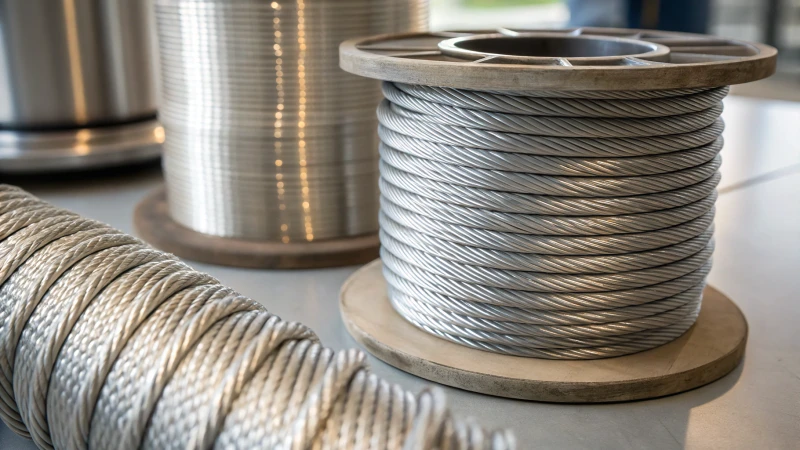
A couple of years ago, I was overseeing a project where the wire ropes we used simply couldn't hold up against the relentless saltwater environment. That's when I discovered the remarkable qualities of stainless steel ropes. They're like the superheroes of the marine world, resisting corrosion almost effortlessly. If you're like me, juggling multiple responsibilities in high-stakes projects, you know how important it is to rely on materials that don't just meet expectations but exceed them.
Stainless Steel and Galvanized Steel
Think of stainless steel as your reliable old friend—always there when you need it most, especially in marine environments7. Its resistance to rust is nearly legendary, and it's become my go-to for projects near salty waters. On the other hand, galvanized steel is a bit like finding a quality budget option; it's about 40% more resistant to corrosion than regular steel, making it perfect for heavy-duty tasks in construction and mining.
| Material Type | Key Benefits |
|---|---|
| Stainless Steel | High corrosion resistance, durable |
| Galvanized Steel | Cost-effective, enhanced corrosion resistance |
Non-Metallic Coatings
Non-metallic coatings have been a game-changer for me, especially with the increasing demand for sustainable solutions. These coatings—think polyethylene or PVC—are not just about protecting the metal underneath but are an eco-friendly8 choice that speaks to our responsibility toward the environment. They offer a dual advantage: superior corrosion resistance and environmental consciousness.
Fiber-Reinforced Composites
Fiber-reinforced composites are like blending the best of both worlds. They offer the robustness of steel with the added strength of fibers. I remember when we first implemented these in an aerospace project; the lightweight yet strong ropes transformed our approach to handling heavy loads efficiently without compromising on safety.
Emerging Market Dynamics
There's a palpable shift towards materials that not only promise superior performance but also embrace sustainability. The industry is buzzing with innovations like bio-based resins and recyclable materials. It’s exciting to see how manufacturers are taking steps to align their products with global sustainability goals—something I’m deeply passionate about as we strive to lower our carbon footprint while maintaining high material reliability.
These evolving trends are more than just industry buzzwords; they are essential tools that help us meet rigorous demands while staying true to our commitment to quality and environmental stewardship.
Stainless steel is the most corrosion-resistant wire rope material.True
Stainless steel offers nearly complete corrosion resistance, ideal for marine environments.
Galvanized steel ropes are more eco-friendly than polyethylene-coated ropes.False
Polyethylene coatings are eco-friendly by reducing metal content, unlike galvanized steel.
Why is Corrosion Resistance Crucial in Industrial Applications?
When I first realized the havoc corrosion could wreak on machinery, I knew understanding it was non-negotiable.
Corrosion resistance is essential in industrial settings as it safeguards materials from environmental harm, extends equipment life, and guarantees safety. Choosing the right materials can prevent expensive repairs and operational interruptions.
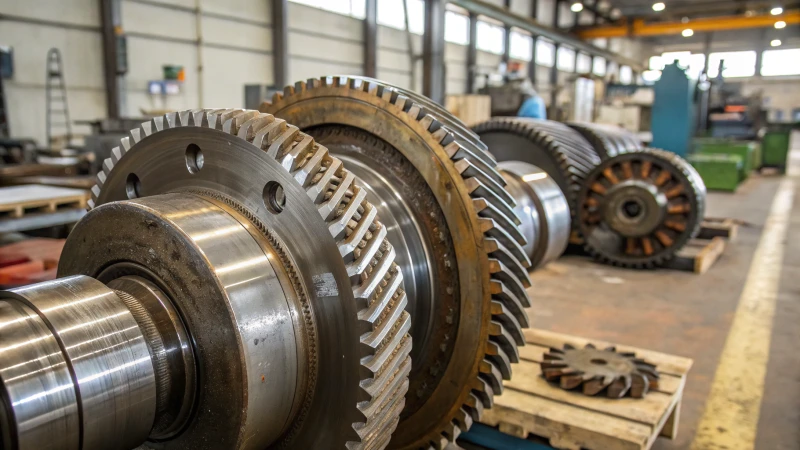
The Impact of Corrosion on Industrial Equipment
I remember the day vividly when a mining operation I was part of came to a screeching halt because of a snapped wire rope. It was a wake-up call on how critical corrosion resistance is. In environments like mining or marine, where machinery is constantly exposed to harsh conditions, the gradual wear from corrosion isn't just an inconvenience; it's a potential disaster waiting to happen. The wires that once seemed invincible become fragile over time, leading to unexpected breakdowns9 and costly delays.
Industrial applications often operate in varied environments, including marine, underground, or chemical processing plants. Each of these settings presents unique challenges for corrosion. In marine environments, saltwater accelerates corrosion in metals, demanding high corrosion resistance.
Materials and Coatings for Corrosion Resistance
Through trial and error, I've learned that the choice of materials can make all the difference. Stainless steel is like the superhero of metals in these situations—its resistance to rust and corrosion keeps operations running smoothly even in the toughest conditions. Additionally, galvanized steel provides a cost-effective solution by offering a protective zinc coating that shields against moisture and oxidation10. And let's not forget about non-metallic coatings like polyethylene or PVC, which are becoming my go-to for eco-friendly and effective solutions.
| Material Type | Corrosion Resistance | Typical Applications |
|---|---|---|
| Stainless Steel | High | Marine, Chemical Processing |
| Galvanized Steel | Moderate | Construction, Infrastructure |
| Polyethylene | High | Eco-sensitive environments |
Economic and Safety Implications
Having been on the front lines of dealing with corroded equipment, I can tell you that it's not just about replacing parts. The downtime eats into productivity, sometimes bringing entire projects to a standstill. Repairing or replacing corroded parts incurs substantial costs and can lead to operational downtime11. And let's face it; when equipment fails unexpectedly, it's not just about dollars and cents—it’s about safety. I've witnessed near-misses that were too close for comfort, driving home the importance of investing in materials that won't let us down.
Industries are increasingly investing in advanced materials and coatings that promise longer lifespans and reduced maintenance needs. This investment not only ensures uninterrupted operations but also aligns with stringent safety regulations and standards.
Environmental Considerations
As someone who’s seen the evolving landscape of industry regulations, I know that going green isn't just a trend—it's becoming a necessity. The shift towards using sustainable materials and coatings not only helps us meet regulatory standards but also minimizes our environmental footprint. For example, non-metallic coatings offer a greener alternative without compromising on performance.
In conclusion, grasping the role of corrosion resistance in industrial applications isn't just theoretical knowledge—it's practical wisdom. It guides me in making informed decisions about materials and maintenance strategies ensuring operational efficiency, safety compliance, and environmental stewardship.
Stainless steel is preferred for marine applications.True
Stainless steel's high corrosion resistance makes it ideal for marine use.
Non-metallic coatings are less eco-friendly than metallic ones.False
Non-metallic coatings are more eco-friendly, offering green alternatives.
Conclusion
Wire ropes resist corrosion through materials like stainless and galvanized steel, along with protective coatings, ensuring durability and safety in harsh industrial environments.
-
Explore how chromium content in stainless steel offers superior corrosion resistance, essential for marine and industrial applications. ↩
-
Learn how zinc coating on galvanized steel provides cost-effective corrosion protection, beneficial for construction and industrial use. ↩
-
Discover why polyethylene coatings are a popular eco-friendly option for enhancing wire rope durability in modern construction projects. ↩
-
Understand the potential advantages of using multiple coatings to create robust corrosion-resistant wire ropes. ↩
-
Discover sustainable coating options that protect wire ropes while minimizing environmental impact. ↩
-
Explore different industrial coatings to find the best fit for your specific use case. ↩
-
Explore why stainless steel is preferred in marine applications due to its corrosion resistance and durability. ↩
-
Understand how eco-friendly coatings contribute to sustainability and material longevity. ↩
-
Explore real-world cases of how corrosion has led to equipment failure, highlighting the importance of selecting corrosion-resistant materials. ↩
-
Learn why galvanized steel is a preferred choice for moderate corrosion resistance in various industrial applications. ↩
-
Understand the financial and productivity impacts when industrial operations are halted due to corroded equipment. ↩

